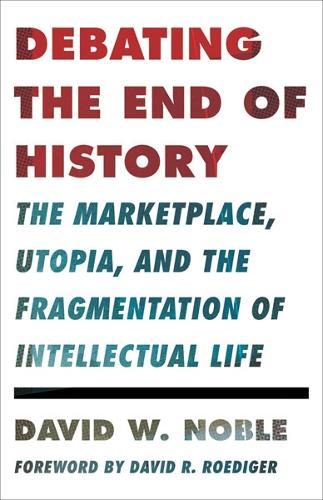Overview
Why do modern people assume that there will be perpetual economic growth? Because, David W. Noble tells us in this provocative study of cultural criticism, such a utopian conviction is the necessary foundation for bourgeois culture. One can imagine the existence of modern middle classes only as long as the capitalist marketplace is expanding. For Noble, the related-and relevant-question is, how can the middle classes believe that a finite earth is an environment in which infinite growth is possible? The answer, which Noble so painstakingly charts, is nothing less than a genealogy of the uses and abuses of knowledge that lie at the heart of so many of our political problems today. As far back as Plato and as recently as Alan Greenspan, Noble finds proponents of the idea of a world of independent, rational individuals living in timeless simplicity, escaping from an old world of interdependence and generations. Such notions, although in sync with Newtonian science, have come up against the subsequent conclusions of geology, biology, and the physics of Einstein. In a survey of the responses to this quandary of historians, economists, literary critics, and ecologists, Noble reveals how this confrontation, and its implications for a single global marketplace, has forced certain academic disciplines into unnatural-and untenable-positions. David Noble's work exposes the cost-not academic at all-of the segregation of the physical sciences from the humanities and social sciences, even as it demonstrates the required movement of the humanities toward the ecological vision of a single, interconnected world.
Full Product Details
Author: David W. Noble ,
David R. Roediger
Publisher: University of Minnesota Press
Imprint: University of Minnesota Press
Dimensions:
Width: 14.00cm
, Height: 1.50cm
, Length: 21.60cm
Weight: 0.295kg
ISBN: 9780816680597
ISBN 10: 0816680590
Pages: 224
Publication Date: 23 October 2012
Audience:
General/trade
,
General
Format: Paperback
Publisher's Status: Active
Availability: Temporarily unavailable

The supplier advises that this item is temporarily unavailable. It will be ordered for you and placed on backorder. Once it does come back in stock, we will ship it out to you.
Reviews
This is a major book by an important American studies scholar who takes a long view of U.S. and transnational history and culture while making important connections to significant contemporary ideas and movements such as neoliberalism and Tea Party politics. David W. Noble makes a compelling case for the continuing significance of the metaphor of two worlds for understanding the neoliberal disorder around us. --Shelley Streeby<br>
"""This is a major book by an important American studies scholar who takes a long view of U.S. and transnational history and culture while making important connections to significant contemporary ideas and movements such as neoliberalism and Tea Party politics. David W. Noble makes a compelling case for the continuing significance of the metaphor of two worlds for understanding the neoliberal disorder around us."" --Shelley Streeby"
This is a major book by an important American studies scholar who takes a long view of U.S. and transnational history and culture while making important connections to significant contemporary ideas and movements such as neoliberalism and Tea Party politics. David W. Noble makes a compelling case for the continuing significance of the metaphor of two worlds for understanding the neoliberal disorder around us. --Shelley Streeby
Author Information
David W. Noble, professor emeritus at University of Minnesota, is the author of many influential books including The Progressive Mind, 18901917, The End of American History, and Death of a Nation: American Culture and the End of Exceptionalism. David R. Roediger is professor of history and African American studies at the University of Illinois, UrbanaChampaign.




